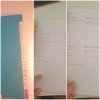Greeting from a cold snowy winter day here in Ontario, Canada. Have been considering this for 2022 as a paper based organizer but have yet to complete the transaction. I would be interested in comments from those using this organizer; both new to it and from longer term users. Pros, cons, etc... what do you like, don't like, wish there was... etc. all comments welcomed. Have noticed there is no option to purchase as A5 format nor option to purchase pre-printed. For point of reference, I have used Day-timers many years ago... more recently just a calendar and blank spiral notebook. Thanks in advance for your input.
You are using an out of date browser. It may not display this or other websites correctly.
You should upgrade or use an alternative browser.
You should upgrade or use an alternative browser.
GTD Organizer
- Thread starter RJA
- Start date
David Leitner
Registered
I really like the paper organizer. Not the fastest to use but for me that is good since I get overwhelmed. I don't use the calendar or the contacts pages since those are digital components in my system.
Murray
Registered
Greetings from a humid subtropical summer day here in Brisbane Australia. I've just switched my projects and project support, and action lists over from Microsoft To Do into the 2022 GTD Organizer. I'm in the process of of migrating someday/maybe but I'm happy for that to be in two places for now.
Reference is still in To Do and OneNote. Calendar is still digital also.
I am using Adobe Acrobat DC Standard but am on the lookout for a cheaper option with the necessary PDF editing capabilities. I work in the PDF and print it out to take with me, then update the paper by hand, day to day.
I am loving the learning experience of getting to grips with a tool that has been designed by the David Allen Co for exactly the purpose I'm using it for. It's like a refresher course in GTD fundamentals.
Plus because I am migrating everything over I am having to look carefully and with fresh eyes at everything in my week to week system. I've deleted or deactivated some projects and actions, and have simplified my set up while keeping some of my customisations from To Do.
I've also been yearning to give paper a go for some time.
It's not my first time using paper but it is the first time in many years. And first time since doing some GTD training courses.
Reference is still in To Do and OneNote. Calendar is still digital also.
I am using Adobe Acrobat DC Standard but am on the lookout for a cheaper option with the necessary PDF editing capabilities. I work in the PDF and print it out to take with me, then update the paper by hand, day to day.
I am loving the learning experience of getting to grips with a tool that has been designed by the David Allen Co for exactly the purpose I'm using it for. It's like a refresher course in GTD fundamentals.
Plus because I am migrating everything over I am having to look carefully and with fresh eyes at everything in my week to week system. I've deleted or deactivated some projects and actions, and have simplified my set up while keeping some of my customisations from To Do.
I've also been yearning to give paper a go for some time.
It's not my first time using paper but it is the first time in many years. And first time since doing some GTD training courses.
Attachments
Last edited:
Relying paper for whole GTD system is really difficult for my case. Most stuff in my inbox will be from emails.
I like writing ideas on notebooks so I found the best way is to first jot down the stuff in notebook everyday, then record them during weekly review/end of each day in digital system.
I like writing ideas on notebooks so I found the best way is to first jot down the stuff in notebook everyday, then record them during weekly review/end of each day in digital system.
radioman
0
I suggest that you google "bullet journal" (including the quotation marks). Note that I have had an all electronic system for many years, but, if I were to go back to a paper system, Bullet Journal is the approach that I would use. The originator spent a great deal of time honing the details of his system, and it makes a great deal of sense to me.
Joe
Joe
benedikt
Registered
Filofax Notebooks are hands down the best I ever had:

 uk.filofax.com
uk.filofax.com
A paper notebook that you can re-order. Perfect to manage your project lists. Comes with dividers and in A5 as well as A4.
I stick to paper since my ADD makes it impossible to keep track of a digital system. It also gives me a good break from the screen that I sit at all day. This morning I reviewed my priorities on a park bench in the sun

Refillable Notebooks & Journals | Filofax
Get that new notebook feeling over and over again with Filofax Refillable Notebooks and our wide variety of refills and accessories. Available in lots of sizes and perfect for class, work, everyday notes or bullet journaling.
A paper notebook that you can re-order. Perfect to manage your project lists. Comes with dividers and in A5 as well as A4.
I stick to paper since my ADD makes it impossible to keep track of a digital system. It also gives me a good break from the screen that I sit at all day. This morning I reviewed my priorities on a park bench in the sun
Ger80C
Registered
Filofax Notebooks are hands down the best I ever had:

Refillable Notebooks & Journals | Filofax
Get that new notebook feeling over and over again with Filofax Refillable Notebooks and our wide variety of refills and accessories. Available in lots of sizes and perfect for class, work, everyday notes or bullet journaling.uk.filofax.com
A paper notebook that you can re-order. Perfect to manage your project lists. Comes with dividers and in A5 as well as A4.
I stick to paper since my ADD makes it impossible to keep track of a digital system. It also gives me a good break from the screen that I sit at all day. This morning I reviewed my priorities on a park bench in the sun
I Second Filofax Notebooks, and other flexible systems like Arc, Atoma, Levenger Circa etc. - all of them come with hole punches in the right format so you can insert printouts as well. Would work great with printed calendar/next action lists, too, I am sure.
We suggest people explore the GTD paper system for exactly that reason--if you "get it," you can then use whatever digital version you want most effectively. I could easily transition back to a paper system (I would get another TimeSystem tool for its elegance)...there's no easier way to grok the gestalt of your life and work, at hand. No matter how cool your computer screens are, they can't match a paper notebook to have your life and work in your hands, whenever, wherever. I traded off for digital tools, simply because of the connectivity and ease of copy/paste. But I did pay a price.I am loving the learning experience of getting to grips with a tool that has been designed by the David Allen Co for exactly the purpose I'm using it for. It's like a refresher course in GTD fundamentals.
Murray
Registered
Yes it was a great "bootcamp" experience for the months I was using it. I still had my calendar online while managing my lists on paper though. Partly because of shared calendars and also for the calendar reminders.We suggest people explore the GTD paper system for exactly that reason--if you "get it," you can then use whatever digital version you want most effectively. I could easily transition back to a paper system (I would get another TimeSystem tool for its elegance)...there's no easier way to grok the gestalt of your life and work, at hand. No matter how cool your computer screens are, they can't match a paper notebook to have your life and work in your hands, whenever, wherever. I traded off for digital tools, simply because of the connectivity and ease of copy/paste. But I did pay a price.
I have found my way back to digital lists, I think basically for the reasons you mentioned. I agree that there is a tradeoff either way.
I love the idea of at least knowing I am able to make the switch at any time, if the need arises or the fancy takes me.
Also I feel like it is somehow similar to the quote about being able to understand one language only when you can speak two (which I don't!)
I have done the same and it works well. The only caveat I'd add about Bullet Journal is that there are a lot of people who do tutorial videos, etc. have totally overcomplicated it. You do not need to use calligraphy for Bullet Journals to work.I suggest that you google "bullet journal" (including the quotation marks). Note that I have had an all electronic system for many years, but, if I were to go back to a paper system, Bullet Journal is the approach that I would use. The originator spent a great deal of time honing the details of his system, and it makes a great deal of sense to me.
Joe
GTDgeekette
Registered
Yes. The term “bullet journal” has become so generic now as to have lost all meaning, thanks to thousands of people online who post their art journals and call them bullet journals. Kind of like the brand names Kleenex and Band-Aid becoming generic terms. Ryder Carroll developed and trademarked the actual Bullet Journal system, so it’s best to include his name in the search terms, or simply go to his website BulletJournal dot com.I have done the same and it works well. The only caveat I'd add about Bullet Journal is that there are a lot of people who do tutorial videos, etc. have totally overcomplicated it. You do not need to use calligraphy for Bullet Journals to work.
That said, there is a robust online community of folks who have incorporated the GTD method into their bullet journals.
Ger80C
Registered
We suggest people explore the GTD paper system for exactly that reason--if you "get it," you can then use whatever digital version you want most effectively. I could easily transition back to a paper system (I would get another TimeSystem tool for its elegance)...there's no easier way to grok the gestalt of your life and work, at hand. No matter how cool your computer screens are, they can't match a paper notebook to have your life and work in your hands, whenever, wherever. I traded off for digital tools, simply because of the connectivity and ease of copy/paste. But I did pay a price.
I can also attest that going *back* to paper after working with a digital system that gets too complicated - as it asks for tags, connections and additional metadata during processing, sometimes more than you can chew off - can be refreshing and re-connects you to the true, elegant rythms of capture-process-organize-reflect-do ....

